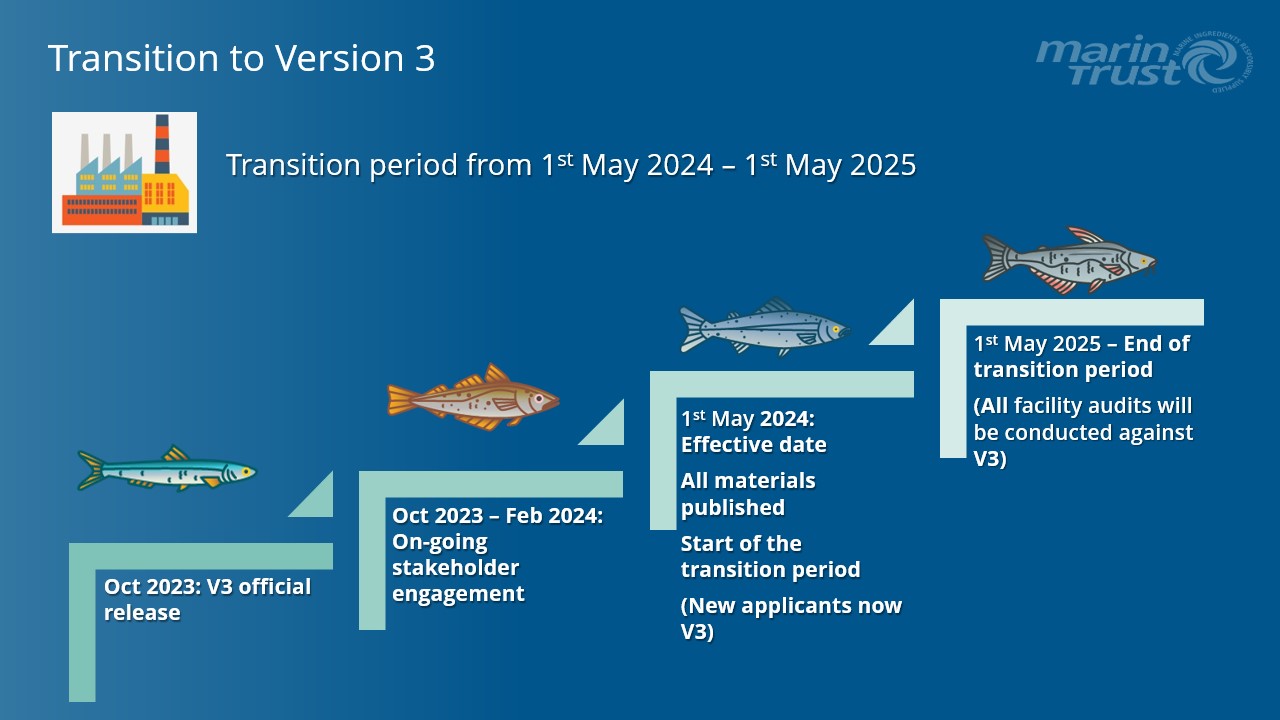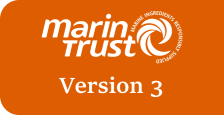Contents
- Overview
- Transition guidance on the recognition of Standards
- Transition plan for whole fish and by-products
- Webinars and Workshops
Overview
To support our stakeholders with the transition to Version 3, we are providing a range of webinars and workshops, along with more guidance on this page. A full overview of Version 3, including the standard and supporting documents is available here.

Current certificate holders
Current certificate holders certified under Version 2 of the Factory Standard will have 1 year from the effective date of 1st May 2024 to understand and apply the revisions. If you are a certificate holder and your recertification or annual surveillance audit falls between 1st May 2024 and 1st May 2025, you can choose to continue with Version 2 or apply for Version 3. However, should the facility not be ready for Version 3 you can continue to be certified against Version 2.
If current holders of certificates under Version 2 of the Factory Standard wish to be audited against Version 3, please contact MarinTrust at [email protected] to be set up with a recertification application form on the online portal.
Switching to Version 3 will commence a new three-year audit cycle, no matter what stage you are at in your current three-year audit cycle.
After 1st May 2025, you will be required at your next audit (annual surveillance or re-certification) to be audited and certified against Version 3 of the Factory Standard.
New applicants to the Factory Standard
New applicants to the Factory Standard will have 6 months from the release of the new version of the Standard to understand updates and requirements until Version 3 becomes effective on 1st May 2024. Between 1st February 2024 and 30th April 2024, MarinTrust will not accept new applications against Version 2 of the Factory Standard.
All Version 2 applications that were approved and shared to the Certification Body prior the cut off date in February 2024, their initial audit should be against V2 of the standard. If the applicant under Version 2 of the Factory Standard wish to be audited against Version 3, they must complete an application form for Version 3.
After 1st May 2024, MarinTrust will accept new applications and pass them on to an approved Certification Body to conduct an audit of the facility(ies) to the requirements of this new version of the Factory Standard. Applications to Version 2 of the Factory Standard submitted after 1st May 2024 will not be permitted.
Transition guidance on the recognition of Standards
(following the effective date of MarinTrust Standard V3)
 Following Version 3 of the MarinTrust Standard coming into effect from 1st May 2024, new applicants and current certificate holders need to be aware how the recognition status for Standards will transition. The current recognised standards under MarinTrust Standard Version 2 are:
Following Version 3 of the MarinTrust Standard coming into effect from 1st May 2024, new applicants and current certificate holders need to be aware how the recognition status for Standards will transition. The current recognised standards under MarinTrust Standard Version 2 are:
- GMP+ B2 Production of Feed Ingredients (January 2023) Standard
- FEMAS Standard 2019 (version 2.1, 2021)
- Chilean Programa de Aseguramiento de la Calidad (PAC)
- Marine Stewardship Council Fisheries Standard (version 2.1, 2018)
To maintain recognition status, currently recognised Standards whose equivalency assessed against criteria contained within MarinTrust Standard V2 will be required to undergo the equivalency assessment against V3 criteria in line with updated ‘recognition of equivalence procedure’. To ensure clarity and cohesion between the transition from V2 to V3 of the MarinTrust Standard and recognition of other Standards, we have published some guidance, outlining key information and requirements.
Who will be affected?
- Certificate holders moving to MarinTrust Standard V3 who utilise currently recognised Standards under of the MarinTrust Standard Version 2.
- Currently recognised Standards against Version 2 of the MarinTrust Standard.
- Standards and benchmark tools who wish to apply for recognition under the MarinTrust Programme.
- New applicants applying against Version 3.
Applicant or Certificate holder | MT Standard Version | Outcome |
|---|---|---|
Current Certificate holder | Version 3 |
|
Current Certificate holder | Version 2 | No change – recognition status of currently recognised Standards shall be maintained until the end of the V3.0 transition period (1st May 2025) or upon the completion of the last facility to be audited against V2. Whichever is first. |
New applicant | Version 3 |
|
Note: Certificate holders and new applicants applying to MarinTrust Standard Version 3 shall not be permitted to use recognition of Standards against MarinTrust Standard Version 2 criteria.
Transition plan for whole fish and by-products
 New applicants and existing certificate holders need to be aware of the transition periods and criteria changes for both by-product assessments and whole fish fishery assessments. To support this, we have provided information on which version of the criteria applies to applications and assessments.
New applicants and existing certificate holders need to be aware of the transition periods and criteria changes for both by-product assessments and whole fish fishery assessments. To support this, we have provided information on which version of the criteria applies to applications and assessments.
Beginning May 1st, 2024, new applicants and re-certifications to Version 3 of the MarinTrust Standard will have their by-product species assessed against Version 3 by-product criteria, while currently approved by-products will continue under Version 2 until May 1st, 2025.
New whole fish fisheries will be assessed against Version 3 criteria from May 1st, 2024, with existing fisheries undergoing re-approval assessments against Version 3 during the transition period. From May 1st, 2025, all assessments, including surveillance, will adhere to Version 3 criteria.
Webinars and Workshops
We are hosting a series of online workshops to assist and prepare you for the MarinTrust V3 Factory Standard. These events provide attendees with practical information on Version 3 and allow feedback. Here is the recording of the first workshop, for Spanish-speaking audiences:
And here is a recording of a workshop for English-speaking audiences:
MarinTrust by-product assessment Version 3: Navigating the transition and assessment requirements
In these webinars, Dr. Emily McGregor, the Fisheries Manager for MarinTrust, provides thorough support to help navigate the newly revised by-product requirements and assessment process. The webinar aims to provide additional clarity on the transition from the current by-product assessment to Version 3. Read the by-product assessment criteria document.
Read the Spanish summary of the presentation here.
Below is the full schedule of past and upcoming webinars and workshops, plus the opportunity to register.
| Event | Location and language | Time zones | Confirmed date |
|---|---|---|---|
| MarinTrust By-Product Assessment Version 3 | Europe | 8am BST | 2 July 2024 |
| Auditor training (3) | Asia | 9:30am China / 8:30am Thailand, Vietnam, Malaysia / 7am India / 8:30pm Peru | 15-16 April 2024 |
| Auditor training (2) | Europe/Africa | 9am UK / 10am Europe / 10am South Africa | 11-12 April 2024 |
| Auditor training (1) | Latin America | 8am Peru / 10am Chile / 2pm UK | 18-19 March 2024 |
| Fishery assessor training | Europe/UK | 10am GMT | 26 February 2024 |
| Webinar: Certificate holders | Europe/Americas | 4pm-5.30pm GMT (London) / 5pm Europe / 8am PST / 10am CST / 11am EST/Peru | 24 January 2024 |
| Webinar: Certificate holders | Europe/Asia/Africa | 9am-10.30am GMT (London) / 4pm Thailand/Vietnam / 2.30pm India | 24 January 2024 |
| Webinar: Certificate holders | Latin and Central America | 4pm Chile-Argentina / 2pm Peru-Ecuador-Panamá / 3pm El Salvador / 1pm Mexico | 14 December 2023 |

 From 1 May 2024, any new applicants to the MarinTrust Programme must apply for audits against Version 3. A transition period of 1 year will allow certificate holders to prepare for audits against the new Standard. From 1st May 2025, all facility audits will be conducted against Version 3.
From 1 May 2024, any new applicants to the MarinTrust Programme must apply for audits against Version 3. A transition period of 1 year will allow certificate holders to prepare for audits against the new Standard. From 1st May 2025, all facility audits will be conducted against Version 3.